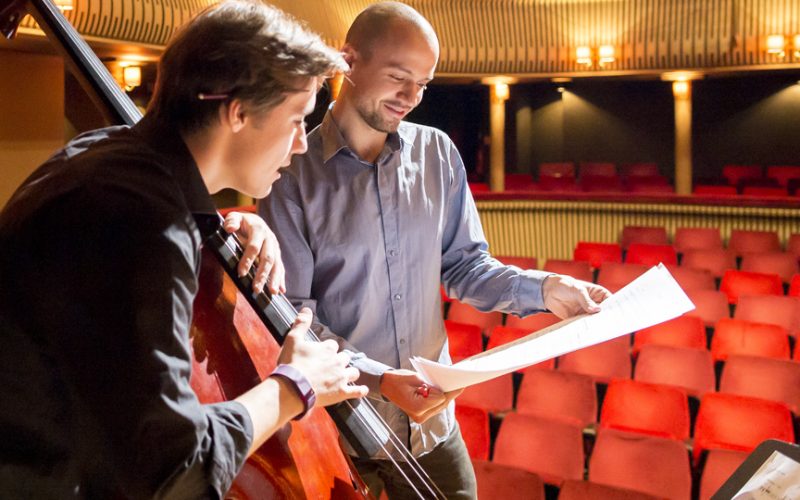Music composition is an art that allows you to translate emotions, inspirations, ideas, and stories into a language understood by all. It’s a challenging but advantageous path, and finding the Best Schools for Music Composition that help you nurture that creativity is essential.
Choosing the right school to study music composition is a crucial step for aspiring composers who want to develop their skills, refine their craft, and lay the foundation for a successful music career.
The best Music composition Schools should offer full programs, innovative curriculums, supportive environments, state-of-the-art facilities, a solid track record of producing talented composers, and opportunities for creative exploration.
In this writing, we will explore the best Schools for Music Composition known for their excellence in music composition education and the factors you should consider when making the decision to choose a music composition school.
Table of contents
- What Is A Music Composition Program?
- What Are The Advantages Of Completing A Music Composition Program?
- Career Paths Of a Music Composer
- 15 Best Schools For Music Composition
- The Juilliard School
- #1. The Curtis Institute of Music in Philadelphia
- #2. The Eastman School of Music in Rochester
- #3. The University of Michigan-Ann Arbor
- #4. The University of California
- #5. The Manhattan School of Music
- #6. Boston University
- #7. Yale University School of Music
- #8. Oberlin Conservatory of Music
- #9. New England Conservatory in Boston
- #10. University of Southern California (USC)
- #11. Columbia University
- What Are the Requirements To Attend A Music Composition School?
- FAQs -Best Schools for Music Composition
- Conclusion
- References
What Is A Music Composition Program?
A music composition program is an academic program that teaches students how to compose music. Music composition programs typically offer music theory, music history, orchestration, and conducting courses. They may also offer classes in electronic music and computer music.
It requires students to complete a portfolio of their work, which may include original compositions, arrangements, and transcriptions. Students may also need to complete music history, music theory, and ear training coursework.
In a music composition program, students typically learn about music theory, harmony, counterpoint, orchestration, form, analysis, and other musical structure and composition elements. They explore different compositional techniques, develop their musical ear, and study the works of famous composers throughout history.
Music composition programs are available at both the undergraduate and graduate levels. Undergraduate programs offer a Bachelor of Arts (BA) or Bachelor of Music (BM) degree. Graduate programs offer a Master of Music (MM) or Doctor of Musical Arts (DMA) degree.
See also: 30 Unblocked Music Apps at School in 2024 | Step-by-Step Guide
What Are The Advantages Of Completing A Music Composition Program?
- You will learn the fundamentals of music theory and composition.
- You will study with experienced composers.
- Students will have the opportunity to collaborate with other musicians.
- You will be given a chance to perform your work.
- You will have the opportunity to network with other composers and musicians.
Career Paths Of a Music Composer
There are different career paths that a music composer can pursue. Some common paths include:
- Freelance composer: Freelance composers work on various projects, such as writing music for films, television shows, video games, and commercials. They may also work on concert music or other types of music.
- Composer-in-residence: Composer-in-residence positions are held at universities, colleges, or other organizations. Composers in these positions teach music composition, conduct ensembles, or write new music for the organization.
- Music educator: Music educators teach music theory, composition, and other music-related subjects at all levels of education. They also conduct ensembles or arrange music for performances.
- Music theorist: Music theorists research and write about music theory and history. They may also teach music theory at the university level.
- Music critics write about music for newspapers, magazines, or online publications. They may review concerts, operas, or other musical performances.
- Music producer: Music producers work with artists and bands to create and record their music. They may also work on film and television soundtracks.
- Sound designer: Sound designers create and manipulate sound for films, television shows, video games, and other media. They may also work on concert music or other types of music.
- Arranger: Arrangers adapt existing music for different ensembles or instruments. They may also write new arrangements for existing music.
- Copyist: Copyists transcribe music from one format to another. They may also create lead sheets or other music notations.
- Music librarian: Music librarians catalog and maintain music collections. They may also provide reference assistance to music students and researchers.
See also: 25 Best Musical Theatre Colleges in 2024
15 Best Schools For Music Composition
These are 15 of the best schools for music composition:
The Juilliard School
The Juilliard School is a private performing arts conservatory in New York City.
It was founded in 1905 by philanthropist Augustus Juilliard.
The Juilliard School in New York City is considered by many to be the best music school in the world. Its music composition program is highly selective and offers a rigorous curriculum that prepares students for music performance, composition, and research careers. The school offers undergraduate and graduate degrees in music performance, music education, music theory and composition, and conducting.
The music composition program at Juilliard is one of the most competitive in the world.
#1. The Curtis Institute of Music in Philadelphia
The Curtis Institute of Music is a private music conservatory in Philadelphia, Pennsylvania.
It was founded in 1924 by philanthropist Mary Louise Curtis Bok.
The Curtis Institute of Music in Philadelphia is another top-ranked music school with a strong composition program. The school’s faculty includes some of the world’s most respected composers, and students can work closely with them on their compositions.
See also: 13 Best Famous Musicals for High School Theatre in 2024?
#2. The Eastman School of Music in Rochester
The Eastman School of Music in Rochester, New York, is known for its innovative music composition program. It is a private music conservatory in Rochester, New York.
The school offers a variety of courses and workshops, and students have the opportunity to work with composers from a variety of genres. The school offers undergraduate and graduate degrees in music performance, music education, music theory and composition, and music history and literature. The 2022-2024 academic year tuition is $49,960 for full-time undergraduate students.
#3. The University of Michigan-Ann Arbor
The University of Michigan-Ann Arbor is home to the prestigious School of Music, Theatre & Dance. The school’s music composition program is highly regarded, and students can study with some of the leading composers in the world. The music composition program at UMich is highly regarded and has produced many notable composers, including William Bolcom, Robert Ashley, and Leslie Bassett. The program offers a robust curriculum with a focus on creativity and innovation.
#4. The University of California
The University of California, Berkeley, is another public university with a strong music composition program. The school’s program is known for its focus on contemporary music, and students can work with composers from various backgrounds.
#5. The Manhattan School of Music
The Manhattan School of Music in New York City is a private music school with a long history of excellence in music composition. The school’s program is known for its focus on both classical and contemporary music, and students can work with some of the most respected composers in the world.
#6. Boston University
Boston University is a private research university with a strong music composition program. The school’s program is known for its focus on interdisciplinary studies, and students can collaborate with composers from other disciplines.
#7. Yale University School of Music
Yale University is a private Ivy League university with a highly selective music composition program. The school’s program is known for its focus on historical musicology, and students can work with some of the leading musicologists in the world.
The program offers a Bachelor of Music (BM) degree in Composition and a Master of Music (MM) degree in Composition. Students can study with esteemed composers, including Martin Bresnick, David Lang, and Christopher Theofanidis.
#8. Oberlin Conservatory of Music
The program offers a Bachelor of Music (BM) degree in Composition and a Master of Music (MM) degree in Composition. Students can study with composers such as Stephen Hartke, Shulamit Ran, and Augusta Read Thomas.
The program is focused on classical music, and students interested in commercial music may not find the program a good fit.
#9. New England Conservatory in Boston
New England Conservatory in Boston is a private music school with a long history of excellence in music composition. The school’s program is known for its focus on classical and jazz music, and students can work with some of the most respected composers in the world.
#10. University of Southern California (USC)
USC is a private research university with a strong music composition program. The school is known for its focus on film and television scoring, and students can work with some of the world’s leading film and television composers.
#11. Columbia University
Columbia University is a private Ivy League university with a highly selective music composition program. The school’s program is known for its focus on interdisciplinary studies, and students can collaborate with composers from other disciplines.
#12. University of Chicago
The University of Chicago is a private research university with a strong music composition program. The school’s program is known for its focus on contemporary music, and students can work with composers from various backgrounds.
#13. Rice University
Rice University is a private research university with a strong music composition program. The school’s program is known for its focus on entrepreneurship, and students can work with composers who are using their music to start businesses.
#14. Berklee College of Music (Boston, MA, USA)
Berklee College of Music in Boston is a vibrant music school. Overall, it is a great school for students interested in pursuing a career in music composition. The program offers a strong curriculum and a talented faculty. However, it is also highly competitive and expensive.
The program is a Bachelor of Music (BM) degree in Composition.
What Are the Requirements To Attend A Music Composition School?
- Application Form: Most schools require you to complete an application form with your personal information, educational background, and contact details.
- Academic Transcripts: You must provide official transcripts from your previous educational institutions, demonstrating your academic performance and completion of prerequisite coursework.
- Letters of Recommendation: Schools often request letters of recommendation from teachers, mentors, or professionals who can speak to your musical abilities, work ethic, and potential as a composer.
- Composition Portfolio: An essential requirement for music composition schools is a portfolio of your original compositions. This may include scores, recordings, or performances of your work. The portfolio should showcase your musical style, creativity, and technical skills.
- Music Theory Knowledge: Strong music theory knowledge is essential for studying composition. Some schools may require applicants to demonstrate their understanding of music theory through placement tests or submission of written assignments.
- Audition or Interview: Many schools will require an audition or interview as part of the application process. This involves performing or presenting your compositions to faculty members or attending a formal interview to discuss your musical background, influences, and goals.
- Statement of Purpose: A written statement outlining your musical background, goals, and reasons for pursuing composition studies can be required. This lets you express your passion for composition and articulate your artistic vision.
- Standardized Tests: Depending on the school and program, you may need to submit scores from standardized tests such as the SAT or ACT (for undergraduate programs) or the GRE (for graduate programs). However, some music composition schools may not require these tests or place less emphasis on them than other academic disciplines.
FAQs -Best Schools for Music Composition
It’s helpful to learn to play an instrument or several.
Learn to read and write music and study music theory.
Learn how to produce recordings using DAW software and MIDI.
Thinking about the essential musical elements, you could start with a rhythm, a melody, or a chord progression (or harmonic setting).
Composers may find a surprisingly lucrative career in advertising and commercial music. Scores for 30-second commercials pay astonishingly well, and many composers have combined commercial work with their classical work.
4-year
Composing music isn’t easy, and it won’t happen overnight. Like anything music-related, practicing is the best way to grow your skills.
Conclusion
Selecting a school for music composition is an investment in your future that requires thorough attention. The skills, knowledge, and network you will gain will be the foundation for an excellent career.
There are many resources available to help you get started. With the right academic environment to nurture your talent, you will be better equipped to navigate the exciting world of music.
References
- UNCO-Best Schools for Music Composition
- Learn-Schools for Music Composition
- Careers in Music-Best Schools for Music Composition



